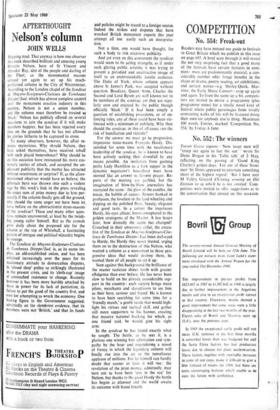Nelson's column
AFTERTHOUGHT
JOHN WELLS
Hopping mad. That anyway is how one observer this week described brilliant and amusing young Horatio Nelson, hero of St Vincent and Aboukir Bay, idol of the people and darling of the Fleet; as the monumental masons refused yet again to set up his much- publicised column in the City of Westminster.
According to the London chapel of the Syndicat de Macons-Sculpteurs-Ciseleurs de• Tombeaux Dieppe/Sud, which has almost complete control over the monument erection industry in this country, Nelson is not a union member, and the column must therefore be treated as 'black.' Nelson has publicly offered on several occasions to join the syndicat if it will make members happier, but has been rejected every time on the grounds that he has not allowed his glories hitherto to be captured in stone.
To many observers, however, the affair re- mains mysterious. Why should Nelson, they have asked themselves, have received rebuff with such placid benevolence? Why should he on this occasion have renounced his more cus- tomary tactics of attack, and accepted the un- pleasant publicity that the matter has attracted without resentment or surprise? If, as the afore- mentioned observer would have us believe, the debonair hero was thrown into such a violent rage by this week's leak-in the press revealing the exact sum of prize money due to him per- sonally if the column finally gets off the ground,' why should the same anger not have been let, loose before on the obstructionist stone-masons of the syndicat? These and many Other ques- tions remain unanswered, at leatt by the twink- ling young sailor himself. But as the crowdS grow daily about the proposed site for the column at the top of Whitehall, a fascinating pattern of intrigue and political wizardry begins to emerge.
The Syndicat de Macons-Sculpteur.s-Ciseleurs de Tombeaux Dieppe, Sud, is, as its name im- plies, an old-established union, and has been criticised increasingly over the years for its reactionary attitude to demarcation disputes, its 'closed shop' policy so strikingly illustrated in the present crisis, and its 'cloth-cap' image of entrenched resistance to change. Recently however it has been more harshly attacked by those in power for its lack of patriotism, its failure to put the good of the country first, and even for attempting to wreck the economy. One leading figure in the Government suggested, admittedly on the slenderest evidence, that its members were not 'British,' and that its funds and policies might be traced to a foreign source. Indeed the strikes and disputes that have wrecked British monument exports this year attempt all too easily such an interpreta- tion.
Not a time, one would have thought, for such a body to risk excessive publicity.
And yet even on this assessment the syndicat would seem to be acting strangely, as if under such glaring public scrutiny it was trying to present a parodied and unattractive image of itself to an understandably hostile audience.
The Duke of York, whose column appears above St James's Park, was accepted without question. Boadicea, Queen Anne, Charles the Second and Lord Byron are well known not to be members of the syndicat, yet they are regu- larly seen and enjoyed by the public though officially 'black.' If it had been simply a question of establishing precedents, or of en- forcing rules, any of these could have been vic- timised with a minimum of publicity. Why then should the syndicat, in this of all cases, run the risk of humiliation and ridicule?
For the answer we must go to progressive, impetuous stone-mason Francois Hardy. Dis- satisfied for some time with the reactionary leadership of the syndicat, he is known to have been actively seeking their downfall by any means possible. An invitation from gushing petite Lady Hamilton to a fork supper in the dynamic negotiator's houseboat must have seemed like an answer to fervent prayer. Re- ports of the meeting are garbled, but the imagination of blow-by-blow journalists has recreated the scene: the glow of the candles, the music, the babble of voices: flowers banked in profusion, the loveliest in the land wheeling and dipping on the polished floor, beauty, elegance and good taste. In a corner the impetuous Hardy, his eyes ablaze, listens enraptured to the golden strategems of the Master. A few hours later, how dismally the scene has changed! Crouched in their unsavoury cellar, the execu- tive of the Syndicat de Macons-Sculpteurs-Cise- leurs de Tombeaux Dieppe Sud listen dull-eyed to Hardy, the Hardy they never trusted, urging them on to the destruction of this Nelson, who wanted a column as a monument to those pro- gressive ideas that would destroy them, he wanted them of all people to set it up.
Seen against this background the brilliance of the master tactician shines forth with greater effulgence than ever before. He has never been slow to build on his already considerable sup- port in the country : each victory brings more pilots, merchants and slavedrivers to see him as their hero, saviour and friend. He is known to have been searching for some time for a 'friendly match,' a gentle tussle that would high- light his virtues and tactical skill, and gather still more supporters to his banner, creating that massive national backing for which, as one friend said, he would give his right arm.
In the syndicat he has found exactly what he sought. The battle, as he sees it, is a glorious one winning him admiration and sym- pathy by the hour and engendering a mood of frenzy in which the legendary column will finally rise into the air to the tumultuous applause of millions. For he himself can hardly doubt that sooner or later it will rise : the revelation of the prize money, admittedly, may turn out to have been 'one in the eye' for Nelson, but thanks to the good Hardy the battle has begun as planned and the world awaits its outcome with bated breath.






































 Previous page
Previous page